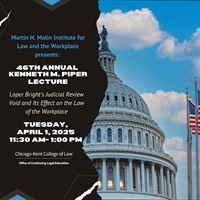46th Annual Kenneth M. Piper Lecture, 04/01/2025, On Demand More info »
46th Annual Kenneth M. Piper Lecture
- Categories:
- Labor Law
- Speakers:
- Anne Marie Lofaso | Roberto Corrada | Fred Jacob
- Duration:
- 1 Hour 30 Minutes
- Product Type:
- Live Event - Also available: On Demand
- Location:
- Chicago-Kent College of Law - Chicago, Illinois
Description
Join us as Anne Marie Lofaso, Professor of Law at the University of Cincinnati College of Law, delivers this year's 46th Kenneth M. Piper Lecture as she addresses Loper Bright’s Judicial Review Void and Its Effect on the Law of the Workplace.
For forty years, the federal administrative law was governed by Chevron, U.S.A., Inc. v. Natural Resources Defense Council (1984). This long-standing doctrine required Article III courts to defer to administrative agencies’ reasonable interpretations of ambiguous statutory language of those laws Congress entrusted those agencies to administer. This act of judicial humility ended with Loper Bright Enterprises v. Raimondo (2024) where the Supreme Court clearly stated: “Chevron is overruled.”
This raises a significant question of administrative law: What standard of review must courts use to review final agency decisions? When the Court initially issued Loper Bright, many suspected that the answer to that question would be easy; reviewing courts would simply apply Skidmore deference under which a court would “consider that the rulings, interpretations and opinions of the Administrator under this Act, while not controlling upon the courts by reason of their authority, do constitute a body of experience and informed judgment to which courts and litigants may properly resort for guidance.”
In this lecture, Professor Lofaso will argue that rather than simplifying administrative law judicial deference, Loper Bright greatly complicates this area and will explore how the courts should review different employment statutes administered by federal agencies now that Loper Bright has left a judicial review void.
This free lecture will be held in the Chicago-Kent College of Law Ogilvie Auditorium and will not be live-streamed.
Speaker
- Anne Marie Lofaso, Professor of Law, The University of Cincinnati College of Law
Commentators
- Fred Jacob, Solicitor, National Labor Relations Board and Professorial Lecturer, George Washington University Law School
- Roberto Corrada, Professor of Law, The University of Denver Sturm College of Law
Speaker

Anne Marie Lofaso Related Seminars and Products
Professor of Law
University of Cincinnati College of Law
Anne Marie Lofaso is a Professor of Law at the University of Cincinnati College of Law, where she teaches labor law, employment law, employment discrimination law, and constitutional law. She is the former Arthur B. Hodges Professor of Law at the West Virginia University College of Law, where she taught for over 18 years. Professor Lofaso is a labor law expert. She has authored over seventy law review articles, primarily on labor and employment law, and over a dozen scholarly blogs, primarily in the area of human rights, focusing on socio-economic rights. She has co-authored two casebooks, Modern Labor Law in the Public and Private Sectors and Public Sector Employment, and one textbook, Mastering Labor Law. She is the author and editor of two labor law treaties, NLRA: Law and Practice and Drafting the Union Contract, and the editor of several other books including Title VII of the Civil Rights Act After 50 Years: Proceedings of the New York University 67th Annual Conference on Labor.
Professor Lofaso is an active public intellectual who has presented nearly two hundred lectures throughout the world and the United States, has testified before Congress on labor law issues, and has appeared in numerous news outlets such as the New York Times, Washington Times, Wall Street Journal, NPR, PBS, Bloomberg Radio, the Daily Labor Report, and Law360 to discuss labor law topics. Professor Lofaso is a former Special Government Employee who served as the Vice President of the U.S. Commission on Civil Rights and a former Commissioner of the Human Rights Commission for the City of Morgantown. She is a College of Labor and Employment Lawyers member and affiliated with the Oxford Human Rights Hub Blog. Professor Lofaso earned her A.B. from Harvard University, magna cum laude, J.D. from the University of Pennsylvania Carey Law School, and D.Phil. from Oxford University, where she wrote her doctoral dissertation on mass economic dismissals in the U.S., Great Britain, and the European Union.

Roberto Corrada Related Seminars and Products
Professor of Law, Mulligan Burleson Chair in Modern Learning
University of Denver Sturm College of Law
Roberto Corrada has devoted his scholarly attention to three primary areas: the rights of ethnic and sexual minorities; the public/private distinction in labor and employment law; and the scholarship of teaching and learning. He has published articles on these subjects in the Wake Forest Law Review, the Cincinnati Law Review, the Houston Law Review, the Miami Law Review, the Catholic University Law Review, the Berkley Journal of Labor & Employment Law; and the Journal of Legal Education, among others. In addition, Corrada has published casebooks in administrative law and employment discrimination law. A distinguished teacher, Corrada has been recognized for his innovative work in the classroom. In 2000, he was selected as national Carnegie scholar for his active and collaborative learning efforts in his labor law classroom. In 2002, he was named University of Denver College of Law Donald & Susan Sturm Professor for Excellence in Teaching and Learning.He has won the University of Denver Distinguished Teaching Award and has been recognized as a DU Law Star. For 20+ years, Corrada has been extensively involved in service work with local and national institutions. In 1998, he was chairman of the board of the ACLU of Colorado. In 2002, he served as chair of the Association of American Law Schools Labor & Employment Relations Section. From 2000 – 2010, he served as secretary of the Latino/a Critical Legal Theory Association. In 2007, he helped form the Denver Urban Debate League, which he currently co-chairs.
Degree(s)
- JD, Catholic University of America (Columbus School of Law), 1985
- BA, Political Science/Speech Communications, The George Washington University, 1982

Fred Jacob Related Seminars and Products
Solicitor, National Labor Relations Board and Professorial Lecturer
National Labor Relations Board (NLRB) & George Washington University Law School
Fred B. Jacob is a labor lawyer and adjunct professor of law. He is currently the Solicitor of the National Labor Relations Board. As Solicitor, Mr. Jacob serves as the Board’s chief legal adviser on questions of law regarding the Board’s operations and the adjudication of NLRB cases in the federal courts. From 1997 to 2014, Mr. Jacob worked in offices throughout the NLRB, primarily as an attorney, supervisor, and Deputy Assistant General Counsel in the Appellate and Supreme Court Litigation Branch.
Prior to his appointment as the NLRB's Solicitor, Mr. Jacob spent four years as Solicitor of the Federal Labor Relations Authority, where he represented the FLRA before all federal courts, advised FLRA components on legal issues arising under the Federal Service Labor-Management Relations Statute, and served as the FLRA’s in-house counsel. Mr. Jacob also clerked on the United States Court of Appeals for the Fourth Circuit, worked in private practice, and began his career as a summer intern in the Legal Affairs Department of DC Comics.
Mr. Jacob teaches labor law as a Professorial Lecturer in Law at the George Washington University Law School. His articles on labor and administrative law have appeared in the Boston College Law Review and the St. John’s University Law Review. Previously, he taught labor and employment law courses at Georgetown University Law Center and the College of William and Mary.
Mr. Jacob received his B.A. from Brandeis University and his J.D. from the Marshall-Wythe School of Law at the College of William and Mary. He is a Fellow in the College of Labor and Employment Lawyers.
Mr. Jacob’s comments in the Piper Lecture are his own and do not represent the National Labor Relations Board or the United States Government.
Location
Chicago-Kent College of Law



